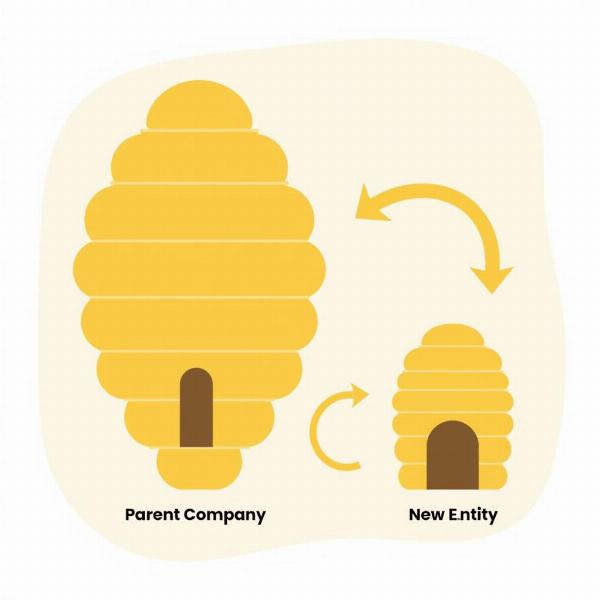Understanding the term “hive off” and its Hindi equivalent is crucial for anyone involved in business, law, or finance in India. This article delves into the meaning of “hive off” in Hindi, exploring its various applications and nuances. We’ll cover everything from legal definitions to practical examples, providing a clear and concise understanding of this important concept.
What Does “Hive Off” Mean?
“Hive off” refers to the process of separating a part of a company or organization to form a new, independent entity. This can be done for various reasons, such as improving efficiency, focusing on core businesses, or raising capital. The separated portion can become a subsidiary, a completely independent company, or be sold to another entity. The term evokes the image of bees separating from a hive to form a new colony, mirroring the business process. Understanding the meaning of “hive off” is essential for navigating the complex world of Indian commerce and finance.
 Hive Off Business Separation
Hive Off Business Separation
Hindi Equivalents of “Hive Off”
While there isn’t a single perfect Hindi equivalent for “hive off,” several terms capture its essence. Some commonly used terms include:
- अलग करना (Alag Karna): This translates to “separate” or “de-merge,” which accurately reflects the core action of a hive-off.
- पृथक करना (Prithak Karna): This also means “to separate” and is often used in legal and formal contexts.
- विभाजित करना (Vibhajit Karna): Meaning “to divide” or “partition,” this term emphasizes the division aspect of the hive-off process.
- कारोबार का एक हिस्सा अलग करना (Karobar Ka Ek Hissa Alag Karna): This phrase translates to “separating a part of the business,” providing a more descriptive and context-specific translation.
The most appropriate term depends on the specific context and the level of formality required.
Why Do Companies Hive Off?
Several strategic reasons motivate companies to hive off parts of their operations. These include:
- Improving Focus: By separating non-core businesses, the parent company can concentrate its resources and efforts on its primary activities.
- Enhancing Efficiency: A smaller, independent entity can often operate more efficiently and nimbly than a larger, more complex organization.
- Raising Capital: Selling off a part of the business can generate significant capital, which can be used for investments or debt reduction.
- Reducing Risk: Isolating risky ventures in a separate entity can protect the parent company from potential financial fallout.
- Strategic Restructuring: Hiving off can be a crucial part of a larger restructuring effort to streamline operations and improve profitability.
Legal and Regulatory Aspects of Hive Off in India
Hiving off in India involves legal and regulatory procedures that must be adhered to. These typically involve approvals from shareholders, regulatory bodies like the Securities and Exchange Board of India (SEBI), and sometimes even the courts. The process is often complex, requiring expert legal and financial advice.
Hive Off vs. Spin-Off: Key Differences
While both involve separating a part of a company, “hive off” and “spin-off” are distinct processes. In a hive off, the separated portion becomes a subsidiary of the parent company, while in a spin-off, it becomes a completely independent entity. This difference has significant implications for ownership, control, and financial reporting.
Practical Examples of Hive Off in India
Numerous Indian companies have successfully utilized the hive-off strategy. For example, a large conglomerate might hive off its textile division to form a separate subsidiary, allowing it to focus on its core businesses of infrastructure and energy. Understanding these real-world examples can help clarify the practical implications of a hive-off.
Conclusion
“Hive off” is a crucial concept in the Indian business landscape. Understanding its meaning, Hindi equivalents, and practical implications is essential for anyone involved in corporate strategy, finance, or law. This article provides a comprehensive overview of the concept, equipping readers with the knowledge to navigate this complex process. Remember, understanding “hive off meaning in Hindi” is just the beginning of a deeper understanding of the dynamic Indian business environment.
FAQ
- What is the simplest Hindi translation for “hive off”? अलग करना (Alag Karna) is the simplest and most common translation.
- Why is understanding “hive off” important? It’s crucial for understanding business restructuring, investments, and financial news in India.
- Is “hive off” the same as “spin-off”? No, they are distinct processes with different implications for ownership and control.
- What are the legal requirements for a hive off in India? They vary depending on the specifics but generally involve approvals from shareholders and regulatory bodies.
- Where can I find more information on specific hive-off cases in India? Financial news sources, company websites, and SEBI filings are good resources.
Connect with Meaning-Hindi.in for Expert Translation Services
Meaning-Hindi.in is your premier partner for professional Hindi translation services. We specialize in various translation needs, including business and commercial documents, legal and certified translations, technical manuals, website localization, and academic papers. Our expert team ensures accurate, culturally sensitive translations that meet the highest quality standards. Whether you need to understand “hive off meaning in Hindi” in a legal context or require translation for any other specialized field, we are here to assist you. Contact us today at [email protected] or call us at +91 11-4502-7584. Let Meaning-Hindi.in bridge the language gap and help you achieve your communication goals.